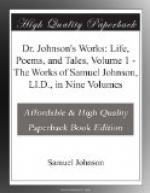XXXI.—To MRS. THRALE.
Lichfield, August 2, 1775.
MADAM,—I dined to-day at Stowhill, and am come away to write my letter. Never, surely, was I such a writer before. Do you keep my letters? I am not of your opinion, that I shall not like to read them hereafter; for though there is in them not much history of mind, or anything else, they will, I hope, always be, in some degree, the records of a pure and blameless friendship, and, in some hours of languor and sadness, may revive the memory of more cheerful times.
Why you should suppose yourself not desirous hereafter to read the history of your own mind, I do not see. Twelve years, on which you now look, as on a vast expanse of life, will, probably, be passed over uniformly and smoothly, with very little perception of your progress, and with very few remarks upon the way. The accumulation of knowledge, which you promise to yourself, by which the future is to look back upon the present, with the superiority of manhood to infancy, will, perhaps, never be attempted, or never will be made; and you will find, as millions have found before you, that forty-five has made little sensible addition to thirty-three.
As the body, after a certain time, gains no increase of height, and little of strength, there is, likewise, a period, though more variable by external causes, when the mind commonly attains its stationary point, and very little advances its powers of reflection, judgment, and ratiocination. The body may acquire new modes of motion, or new dexterities of mechanick operations, but its original strength receives not improvement: the mind may be stored with new languages, or new sciences, but its power of thinking remains nearly the same, and, unless it attains new subjects of meditation, it commonly produces thoughts of the same force and the same extent, at very distant intervals of life; as the tree, unless a foreign fruit be ingrafted, gives, year after year, productions of the same form, and the same flavour.
By intellectual force, or strength of thought, is meant the degree of power which the mind possesses of surveying the subject of meditation, with its circuit of concomitants, and its train of dependence.
Of this power, which all observe to be very different in different minds, part seems the gift of nature, and part the acquisition of experience. When the powers of nature have attained their intended energy, they can be no more advanced. The shrub can never become a tree. And it is not unreasonable to suppose, that they are, before the middle of life, in their full vigour.
Nothing then remains but practice and experience; and, perhaps, why they do so little, may be worth inquiry.
But I have just now looked, and find it so late, that I will inquire against the next post night. I am, &c.




